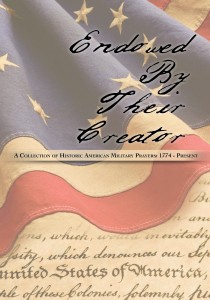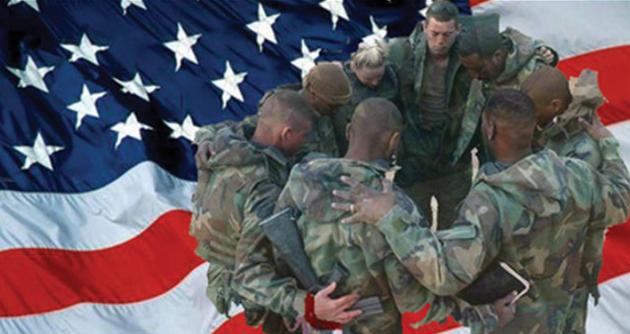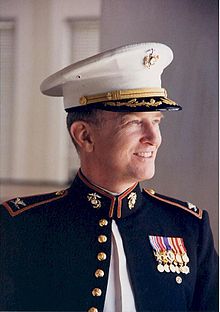The Case for Military Prayer
The national security of the United States depends on military prayer. The greatest threat to our national security is the “war on prayer” currently being waged within our military.
 I make these statements after reading the book “The Case for Military Prayer” by Colonel Ronald D. Ray, USMC (Ret.). Colonel Ray writes, “Our son graduated from boot camp in the spring of 2001 and entered VMI [the Virginia Military Institute] that August, just prior to 9/11. The following year, in 2002, the ACLU, and others, sued VMI to force the Institute to stop daily mealtime prayers.”
I make these statements after reading the book “The Case for Military Prayer” by Colonel Ronald D. Ray, USMC (Ret.). Colonel Ray writes, “Our son graduated from boot camp in the spring of 2001 and entered VMI [the Virginia Military Institute] that August, just prior to 9/11. The following year, in 2002, the ACLU, and others, sued VMI to force the Institute to stop daily mealtime prayers.”
In 2002, Colonel Ray collaborated with First Principles Press and the Naval Aviation Foundation to defend the right of cadets at VMI. The case went to an en banc hearing before the Fourth Circuit Court of Appeals in Richmond, VA, which deadlocked 6-6. The case went on to the US Supreme Court, which declined to hear the ACLU vs. VMI case formally, but issued a remarkable and very unusual sixteen page opinion that concluded by declaring, “there was no injunction blocking prayer at the Virginia Military Institute.”
This led Colonel Ray on a path to research and gather historical documents and government issued prayer books used by military forces from 1643 to the present. The compilation of his efforts led him to understand that, “From that moment, from that generation to mine, I realized the history of American military prayer was a constant thread.”
“Further research revealed that prayer is vital to the US military, part of our ‘equipment’, as one famous general put it. This belief and confidence in prayer has spanned more than 350 years,” states Colonel Ray.
Colonel Ray notes, “Through our research, I was further impressed to learn that prayer was considered a foundation of the American military particularly by John Adams, who led the military committee that drew up the two first principles of the American military which are 1) Exemplary Conduct; and 2) Daily Prayer.”
Colonel Ray’s collection of prayers during the VMI case to “uphold and preserve the right of leaders and chaplains to pray” serves a dual purpose: First, it demonstrates the “Military Necessity” of prayer to the success of America’s military leaders and mission. Secondly, “military prayer is being disregarded, officially opposed by political and military leaders, and often treated as ceremonial deism or mere formality in military and nonmilitary circumstances.”
This historic collection, “Allows anyone regardless of rank or station, the opportunity to understand the crucial history of prayer, draw from its pages an evidentiary military prayer associated with a historic occasion or prayed by a significant historic figure, and use the collection individually or in groups to serve as inspiration in time of trial.”
As an Army Reservist currently serving in Afghanistan, who received a copy of the book, put it, “I particularly enjoyed the historical aspect of the prayers in your book, as it connects me to the long tradition of men serving in America’s military … Others survived it before, and we’ll survive it too.”
As the voices of presidents and military heroes recorded in this book have continuously maintained, America and her fighting forces must not lose touch with our nation’s understanding of the “Creator” named in the Declaration of Independence, and His broad and great endowment of Divine Providence for our “One Nation Under God.”
Prayer is ultimately vital to America’s national security, perhaps more so than any other nation in the world, because God has put His name here. Our official national motto, since its origin in the War of 1812 and official adoption in 1956 has been, “In God We Trust”. Our way of life is inextricably linked to our “Creator” by whom we were endowed with the right to Life, Liberty and the Pursuit of Happiness. Our soldiers in the field today need the support of prayer, especially when prayed by their chaplains and led by their Officers.
As General George C. Marshall declared, for the military to lose or ignore the “religious fervor of the soul is done at great peril.”
Chaplain James H. O’Neill, Chaplain for General Patton and the Third Army wrote, per the request of General Patton, in Training Letter No. 5, “[W]e must urge, instruct, and indoctrinate every fighting man to pray as well as fight … This Army needs the assurance and the faith that God is with us. With prayer, we cannot fail.”
I thank Colonel Ray for his service to the nation and for compiling this much needed book of military prayers. It is a must read for all Americans.
VIDEO: Endowed by Their Creator.
ABOUT COLONEL RONALD D. RAY
Ronald D. Ray is a former Deputy Assistant Secretary of Defense under the Reagan administration. He is also a decorated Vietnam veteran and Colonel. He is now a practicing attorney in Kentucky.
Colonel Ray was born in Hazard, Kentucky on October 30, 1942. He received his B.A. from Centre College of Kentucky in 1964, and his juris doctorate, Magna Cum Laude, in 1971 from the University of Louisville School of Law, where he was Salutatorian in his class. Colonel Ray was a Partner with Greenebaum, Doll & McDonald for 15 years, and until 1986 headed the Labor and Employee Relations section of the firm. Colonel Ray was Adjunct Professor of Law at the University of Louisville School of Law for many years.
RELATED COLUMN: Outrage as Army bans word ‘Christmas’: ‘Treats pornography better than it does Christmas’




Trackbacks & Pingbacks
[…] The Case for Military Prayer […]
[…] https://drrichswier.com/2013/12/25/the-case-for-military-prayer/ […]
Comments are closed.